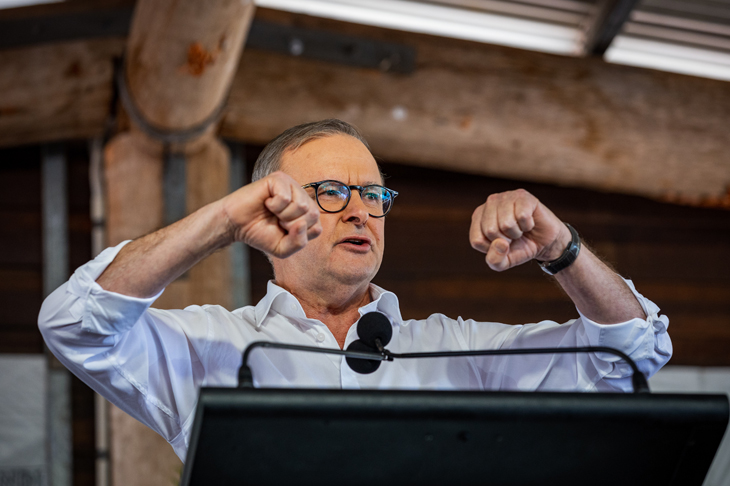A fascinating event occurred at the ALP national conference last weekend. No, it was not that the left wing dutifully went along with the plan to build our very own nuclear submarines as part of the Aukus deal. That was always predictable. But what was really startling was the way in which the party extricated itself from the obvious clash between wanting to be seen as responsible on defence and hence supporting Aukus and yet, at the same time, hanging on to the remaining threads of its left-wing, peacenik, lovey-dovey idealism, an important issue for the ALP as it fights to keep the Greens at bay.
You have to give the Labor party full marks for dancing the stately minuet that got them through the conference, kept Albanese’s reputation intact and showed the public how reliable the ALP is on defence, but also enabled it to say that peace was a good thing and that they would not allow the US to push us around or drag us into wars we do not like.
This balancing act was no mean feat. But how did they do it? They did it by adopting exactly the process that some of us have been telling the ALP for months they should follow in the debate on the Aboriginal Voice, but a process they have regularly rejected. We have said the government has a duty to the people to explain in detail exactly what the Voice will do, what its powers will be and how it will help Aboriginals improve their living standards. These are all reasonable questions and the bare minimum that voters should be given before they vote on such a momentous proposal. But no, the government refuses to give us the detail and it all remains a secret with which the public apparently cannot be trusted.
But when the Aukus submarines came up at the ALP conference, it was a different story. Yes, the party’s leaders said, people are entitled to know exactly what Aukus is and how it will work. More detail was needed for delegates to digest before they were called on to vote, and detail they would have. The party’s apparatchiks had no trouble in writing up a 32-page ‘Statement in Detail’ which became part of the proposal and was duly hoisted up for delegates to vote on, which they did, and favourably. The detail had won the day. What was going to be a defeat for the government on an important issue of defence policy was turned into a victory – and all because of the Statement in Detail. Providing details gets results.
The detail given to the conference on Aukus was the defence equivalent of the detail that people are entitled to have on the Voice. It asked why the government was supporting Aukus and proposing to build nuclear submarines? It then asked how this would be done ‘consistent with Labor values’? It was so significant and all-embracing that the ALP’s acolytes in the Guardian announced that the Statement in Detail would ‘cover the whole shebang’ and give the conference everything it wanted to know.
And isn’t that exactly the detail we should be given before voting on the Voice? For instance, why is the government supporting the Voice when we already have so many Aboriginal agencies that are doing exactly what the Voice will do? Why is it needed at all? The ‘how’ is just as important. How will members of the Voice be appointed? Why will they be appointed, but not elected? What happens if the Voice’s advice is rejected? Will this process be able to delay development projects? And how will the Voice be delivered, consistent with Australian values embodied in our constitution?
The question then obviously arises. Why is the government so keen to give us 32 pages of detail on defence and submarines, a sensitive subject, but no detail on the Voice? It would not need 32 pages to give us this detail and ten pages would do. Indeed, now that we know the government is so keen on the Statement from the Heart being only a single page, I would settle for a single page of detail on the Voice. But no pages at all? That begins to look like carelessness. And again, the contrast is blinding: immense detail on defence, but none on the Voice. Why?
The answer is pretty obvious when you think about it. Defence is a good subject for governments because it is all good news, at least when we are not in a war. It is all colour and movement, flypasts, marching bands, dressing up, medals, heroism, state visits, big contracts for local firms, loyalty to allies, and, as the government takes pleasure in telling us, thousands of well-paid ‘union jobs’.
But with the Voice it is different. It is the policy where the detail dare not speak its name. It must be kept secret because, if the detail is exposed to the light of day, no one would vote for it. Why would the government want to give us the detail, when it would show how the Voice will upend our constitution, put racism at its centre, create new elites, have members who will not even be elected and how it will be duplicated by mini-Voices in every region? Indeed, why are the powers of the Voice to be determined after the referendum has set it up and not before, so that everyone could see what they are voting on? Let us be frank – the government is keeping the detail of the Voice from us because the detail would spell its death. No wonder they want to keep it a secret.
The ‘statement in detail’ may have saved the government’s bacon on defence. But the sharp contrast between its openness on defence and its secrecy on the Voice should make every voter very suspicious of what will be revealed if the referendum succeeds.
Got something to add? Join the discussion and comment below.
Get 10 issues for just $10
Subscribe to The Spectator Australia today for the next 10 magazine issues, plus full online access, for just $10.
You might disagree with half of it, but you’ll enjoy reading all of it. Try your first month for free, then just $2 a week for the remainder of your first year.















Comments
Don't miss out
Join the conversation with other Spectator Australia readers. Subscribe to leave a comment.
SUBSCRIBEAlready a subscriber? Log in